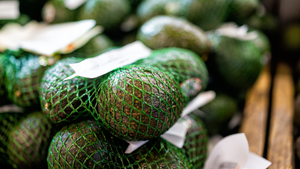BETTER MERCHANDISING OF PREPARED FOOD URGEDBETTER MERCHANDISING OF PREPARED FOOD URGED
RANCHO MIRAGE, Calif. -- Supermarkets must improve their handling and merchandising of fresh prepared foods if they hope to compete with retail food-service operators, an industry consultant told the annual meeting here of the Atlanta-based Refrigerated Foods Association."Most supermarkets need to do a better job at store level handling products and maintaining the right temperatures on displays because
March 4, 1996
ELLIOT ZWIEBACH
RANCHO MIRAGE, Calif. -- Supermarkets must improve their handling and merchandising of fresh prepared foods if they hope to compete with retail food-service operators, an industry consultant told the annual meeting here of the Atlanta-based Refrigerated Foods Association.
"Most supermarkets need to do a better job at store level handling products and maintaining the right temperatures on displays because what the consumer sees doesn't look clean or safe," said Marcia Schurer, president of Culinary Connections, Boulder, Colo.
The consumer's negative impression shows up in surveys that indicate only 20.9% of consumers use supermarket delis for buying meals, Schurer said, "so there's a lot of room for growth."
Some regional independents do a better job than large supermarket chains with prepared fresh foods, according to Schurer, who singled out Wegmans Food Markets, Rochester, N.Y., and Ukrop's Super Markets, Richmond, Va., for particular praise.
"Some chains do a great job at one or two units, but not at the other 50 or 100," she pointed out. "So the problem is, even if a store has the right product, there's no guarantee it will handle or merchandise it properly."
Schurer said supermarkets were doing a better job with prepared foods five years ago. "Today, I see more supermarkets moving those items back into the service case, and they haven't grown very much in terms of the mix of prepared entrees they offer.
"In fact, most still offer primarily sandwiches and pizza as commodity items."
Even supermarkets that do offer self-service fresh foods give the category only limited space, Schurer said, citing as examples Pavilions, a division of Vons Cos., Arcadia, Calif., and Gelson's Markets, a division of Arden Group, Los Angeles. Schurer said there was a lot of talk five years ago that supermarkets were taking 5% of food-service business away from the prepared foods industry. "But food service is taking back that business today and aggressively pursuing it with their own retail locations," she said.
In talking with supermarket operators, Schurer said she's aware of a shift in attitude. "Many of them recognize how hard it is to do a good job, and they don't want a fast-food operator in their store, so they're willing to consider fresh foods.
"But a supplier can spend all the time he wants on research and development, putting it in the right package and getting it to the store fresh, but the product can still die if it's not handled properly."
Asked whether prepared foods are a profitable item for supermarkets, Schurer replied, "It depends on the operator. It has proven to be profitable for some operators who know what they're doing in terms of how much to display and how much will sell.
"Fresh prepared foods are supposed to give better margins -- somewhere around two or three times the contribution to store profit that meat carries -- and that holds true, as long as supermarkets sell them and don't have to throw them out."
She agreed with an attendee who suggested that retailers might have unreasonable expectations for the performance of deli products, with 60% markups on value-added products.
"Retailer expectations may be unrealistic, especially when the products are supplied by a manufacturer, because they don't involve the heavy labor costs of doing it in-store," Schurer said.
"But supermarket retailers still want to get the most shelf life out of the products they carry, and that often defeats the element of freshness."
Increasing the sale of fresh prepared foods at the supermarket will require consumer education, Schurer said. "When supermarkets are trying to build up that part of their business, consumers need to taste it to see if it meets their expectations."
About the Author
You May Also Like






